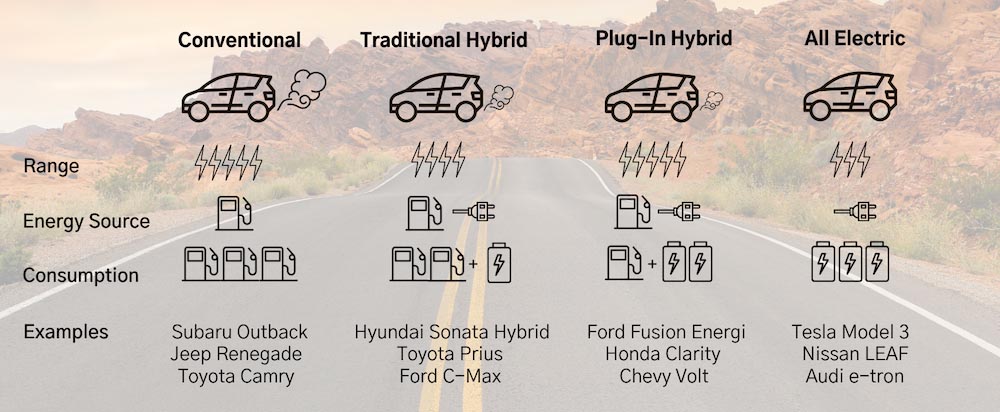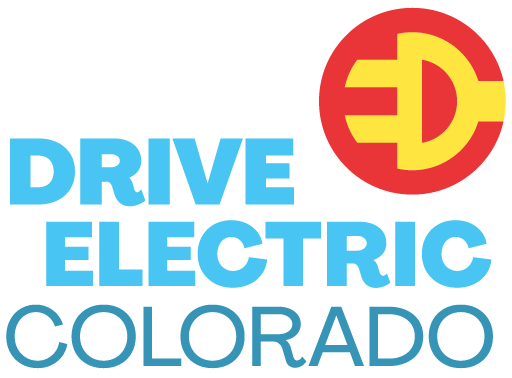Frequently Asked Questions
Are EVs better for the environment?
EVs run more efficiently, have no tailpipe emissions, and produce fewer emissions overall.
EVs run much more efficiently than gas cars. In fact a report by the International Council on Clean Transportation (ICCT) found that 'emissions over the lifetime of average medium-size BEVs registered today are already lower than comparable gasoline cars by … 60% — 68% in the United States' (ICCT Report, 2021).
Additionally, all fully electronic vehicles have zero tailpipe emissions, so you are not actively polluting when you drive compared to a gasoline powered car.
Everyday the grid is getting cleaner and more efficient. As technology continues to advance and alternative forms of energy increase in usage, the grid will produce less and less emissions. Electric vehicles will overall produce significantly fewer emissions than gas cars.
EVs also produce little to no noise, reducing noise pollution on our roads.
Are EVs less expensive to drive?
Charging your EV costs significantly less than fueling gas cars. In fact it costs approximately $1 / gallon to charge your car compared to $5 / gallon for gas cars.
There is also a lot less upkeep and maintenance costs for EVs. Total cost ownership of EVs has proven to be lower than gas cars with $6,000 in overall savings. According to this recent Consumer Reports article, EV owners are spending half of what gas-powered vehicle owners spend on maintenance. The U.S. Department of Energy also concluded that EVs have much lower maintenance costs than gas-powered cars, compared by specific maintenance task and cost per mile overall.
There are also various tax credits, incentives, and rebates available to make EVs affordable. On our website we outline more information on available tax credits and utility incentives.
Want more information? Watch these videos, "Evoking Confidence: Are EVs cheaper than gas-powered vehicles?" and "Evoking Confidence: Are EVs cheaper to maintain than gas-powered vehicles?" and share!
Are EVs safe?
Yes! EVs have a lower center of gravity than gas-powered cars, meaning they’re less likely to roll over in the event of a crash. Check out these EV crash test ratings to see for yourself. In addition, reduced or zero emissions also mean that EVs facilitate cleaner, safer, and healthier air for us to breathe, and contribute less to transportation-related air pollution. The Environmental Defense and the Ontario Public Health Association found that this improvement in air quality from just one electric vehicle would yield $10,000 in social benefits. Any other questions? Check out our EV Myths page for more information and to help you determine what’s true and what’s false!
Do EVs have all wheel drive?
Many EVs come with all-wheel drive. Check the vehicle list for more information about models that have AWD.
For a more comprehensive list of EVs that have all-wheel drive check here.
How long does it take to change?
- 110 Outlet (regular electrical outlet in your home): 4–6 miles of range per hour of charging
- Level 2 chargers (dryer outlet, or many public chargers): 20–40 miles of range per hour of charging
- Fast-charging stations: deliver 150 to 500+ miles of range per hour.
Charging is affordable, too! EVs measure fuel efficiency through kilowatt-hours (kWh) per 100 miles. Kilowatt-hours are measures of electrical energy, and EV users generally pay less per mile than the drivers of gas-powered vehicles. The most common mix of charging results in paying the equivalent of 80–85 cents/gallon.Click here for more information about charging.
What are some cool perks about driving an EV that I might not know about?
Many public EV chargers are located in prime parking spots in the lot. You get to take advantage of a great parking space while you charge your car!
EVs have great acceleration and are very fun to drive.
EV communities are a fantastic way to connect with other local EV enthusiasts! Check out some EV clubs near you.
Why are EVs good for the United States?
EVs promote U.S. energy independence because the fuel (electricity) is produced locally so there is no dependence on foreign oil. Gas and diesel fueled vehicles require the U.S. to invest heavily in foreign nations that mine, refine, and process oil.
What does kWh mean?
kWh stands for kilowatt-hour. This is a unit of energy and can describe the capability of the car, similar to miles per gallon for a gasoline car. The kWh will differ depending on your electric vehicle. However, most EV sedans will get 3 to 4 / kWh.
This article by Forbes goes into greater detail about what kWh is and why it is important to understanding how pricing for charging is determined.
Can EVs go on road trips?
Of course! While it'll depend on each EV's range, you can still road trip in an EV. It does require more planning than a road trip in a gas vehicle, but EV owners appreciate the extra breaks. Popular route planning apps include A Better Route Planner and Plugshare to plan road trips and find chargers along the way.
Watch more in this video "Can I still take road trips in an EV?" and share!
How does extreme weather affect EVs?
Weather is one factor to consider when switching to an EV. If you live somewhere that gets consistently cold, you could expect the range of your EV to drop anywhere from 20–30% (depending on how extreme the cold is).
If you drive less than 200 miles per day and have access to charging, this shouldn't affect your driving ability. If you drive over that, you may want to consider a plug-in hybrid electric vehicle instead.
Watch this video, "Evoking Confidence: How does extreme weather affect EV range?" for more information and share!
Interactive Tools and Calculators
Use these interactive tools to help you understand more about EVs!
Home Charging Advisor: Find chargers and incentives for charging your electric car at home (by zipcode)
eGallon: Compare the costs of driving with electricity
Carbon Counter: Evaluate your car model against greenhouse gas targets
List of Acronyms
If you are new to the electric vehicle scene, the acronyms can be hard to handle! Here is your guide.
Types of Vehicles
AEV: All-Electric Vehicle
AFV: Alternative Fuel Vehicle
BEV: Battery Electric Vehicle
EREV: Extended Range Electric Vehicle
EV: Electric Vehicle
FCV / FCEV: Fuel Cell Electric Vehicle
HEV: Hybrid Electric Vehicle
HFCV: Hydrogen Fuel Cell Vehicle
ICE: Internal Combustion Engine
PHEV: Plug-in Hybrid Electric Vehicle
ZEV: Zero Emission Vehicle
Electricity
AC/DC: Alternating Current/Direct Current
DCFC: Direct Current Fast Charge
KW: Kilowatt
KWh: Kilowatt Hour
MPGe: Miles per gallon equivalent
MW: Megawatt
MWh: Megawatt Hour
TOU: Time of Use (Rate)
Other Equipment/Components
AER: All-Electric Range
CAFE: Corporate Average Fuel Economy Standards
EVSE: Electric Vehicle Supply Equipment
OEM: Original Equipment Manufacturer
For an even more comprehensive list, see here.


